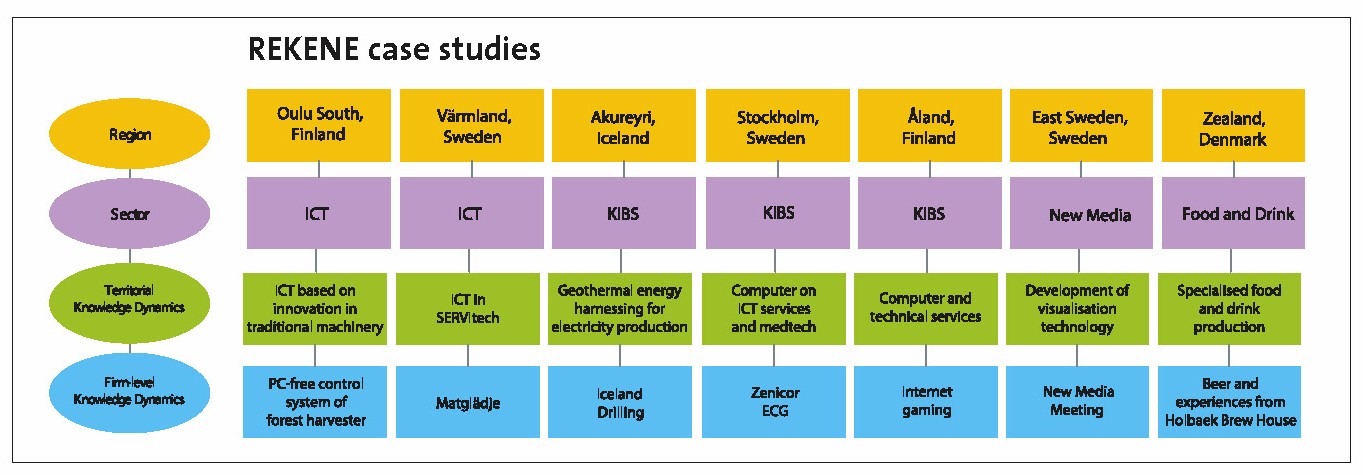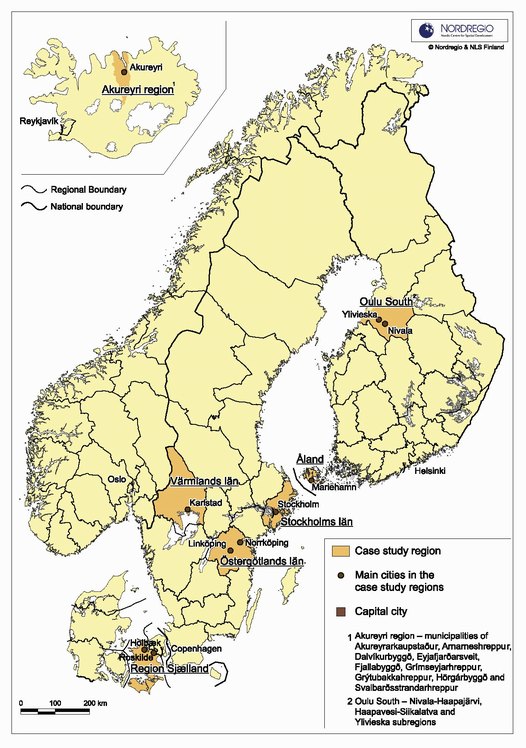The main objective of the project was to investigate how knowledge is generated, developed and transferred within and among firms or organisations and their regional contexts in order to gain a better understanding of how policies may be developed and used to facilitate innovation. A specific aim of REKENE was to deliver a policy toolkit regarding knowledge dynamics.
The regional level provided a point of departure for the empirical case studies. However knowledge dynamics are not restricted to administrative regions. Instead, knowledge interactions stretch across administrative borders.
The importance a regional context may play is also seen in the concept of regional trajectories. These can be seen as paths to move towards a knowledge economy. The paths are developed and changed over time through processes such as investments and decisions made by firms and public bodies, and by changes in the global economy.
Methods and implementation
In the context of the REKENE project, the knowledge dynamics in seven regions in Denmark, Finland, Iceland and Sweden were investigated. In EURODITE, a further 22 regions were studied. The REKENE project was designed to include cooperation between researchers and practitioners. Each region participated with a researcher-practitioner team. This unique way of working has been valuable both in terms of the research process and for working with policy tools. Over the project's duration 18 different partners took part.
In addition, research has been enriched by the showcases the project has visited in each region. The participants met with key actors such as innovative firms, regional authorities, cluster organisations and higher education institutions that demonstrated their approach to working with knowledge dynamics. The showcases provided an opportunity for participants to engage interactively in testing, analysing and developing emerging knowledge about knowledge dynamics.
The research work carried out was based on the use of the region, sector, territorial knowledge dynamics, and firm-level knowledge dynamics as 'building blocks'. Territorial knowledge dynamics involve knowledge exchange, networks and interactions among actors. Key actors here may include firms, higher educational institutions, chambers of commerce and local and regional authorities.
Knowledge dynamics are multi-scalar and include important interactions at great distances. The firm-level knowledge dynamics analysis contributes with depth and detail on how knowledge is developed and transferred at the micro level. The links between firm-level and territorial knowledge dynamics are seen through the interaction among actors.
Results and conclusions
REKENE's main findings can be summarised as follows:
1. Cross-sectoral knowledge interactions are innovative and drive product development. Combinatorial knowledge processes drawing on different disciplines and fields of expertise are at the heart of the processes. Innovations come about not only by adding new knowledge within one's own field of expertise but through interaction with knowledge in other areas of expertise.
There are several interesting examples of cross-sectoral knowledge interactions between, for example, actors within the ICT sector and actors in packaging, machinery and within the health care and medical equipment sectors. Additionally, in the more traditional sector of food and drink, we see how knowledge of brewing is combined with knowledge of marketing or branding in the development of a microbrewery helping it to become part of the 'experience economy'.
2. Knowledge interactions are multi-scalar. All cases of territorial and firm-level knowledge dynamics include extra-regional knowledge interaction. It is evident that a region is not a closed container. Multi-scalar interactions are supported by policy instruments, ranging from cluster organisations to support for organising and participation in various events.
3. Knowledge dynamics include many actors. Many types of actors conduct a variety of knowledge interactions. This supports the conclusion of combinatorial and cross-sectoral knowledge interactions promoting innovation. Public actors, stretching from the national to the local level, play a role in the generation, development and transfer of knowledge. Multi-actor, public–private endeavours and triple helix approaches have become mainstream policies in many places. Examples of these include innovation platforms, industrial PhDs, science parks and incubators, knowledge brokering activities and user-driven problem solving.
A challenging way of working
The REKENE project has been a rewarding but challenging way of working. To systematically work with teams of researchers and practitioners, and to travel to each of the case study regions to engage with local actors in showcases, has been very stimulating for the research and development of policy tools and for continuous knowledge sharing.
It has, however, proved to be a major challenge to effectively develop these ways of working collectively with participants using numerous different professional languages, and with often dissimilar aims and time horizons. Although, as in the theoretical framework of the project, combinatorial and cross-sectoral knowledge interactions are innovative, and we believe that the project results produced have thus been more creative through this way of working.
Knowledge sharing
True to the spirit of the project, REKENE continued the knowledge sharing goal between researchers, practitioners, representatives from higher education institutions and firms, throughout the project. At the conclusion of the project, a major knowledge sharing event took place in Stockholm 24-25 August 2010. The results of the project were presented and discussed, and policy tools were explored and reflected upon in the workshops.
Some of the showcase firms and actors were also present and provided opportunities for the 'hands on' experiencing of innovations. In addition, three international experts were invited to provide their own input and reflections on the project. These speakers provided perspectives on regional knowledge dynamics from the national, regional and local levels linking their own work with that of the project.
The experts were Janne Antikainen, Ylva Williams, and Karl Ritsch, They have kindly updated their conference presentations to be included here as the short articles reproduced below.


By Margareta Dahlström, Former Senior Research Fellow, Deputy Director, Nordregio, Sweden, REKENE project manager, Now at Karlstad University, Sweden
Read more about the project design, participants, case studies and results at the project's home page Rekene and in the final report Dahlström, M. and Hedin, S. (eds) (2010) Regional trajectories to the knowledge economy – Nordic-European comparisons and in the Policy Tools document. These are both available to download free of charge from Nordregio's home page. Read more about EURODITE.